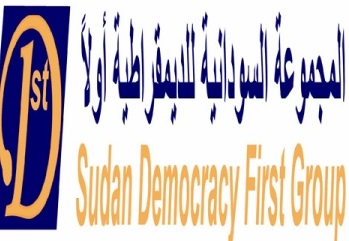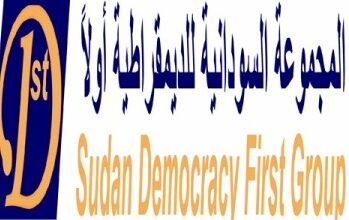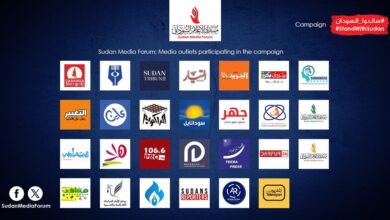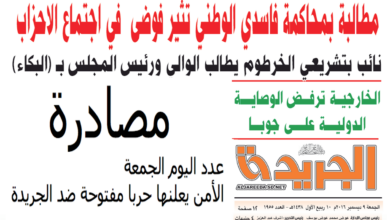
Sudan Democracy First Group
January 14, 2016
There has been a severe shortage of cooking gas in many Sudanese cities since the beginning of October 2015. In a press release, the Sudanese Ministry of Oil and Gas attributed the shortages to the maintenance of Al Jaili refinery, which covers about 80% of local gas consumption. Moreover, the press release added that it was the most major maintenance in 15 years, which intended to increase the production capacity of the refinery from 47% to 56%. (Al Nilain website, 29 November 2015).
Despite the official government explanations of the gas shortages, however, statistics from the Sudanese Petroleum Corporation indicated a supply gap of 50% of the estimated annual consumption of 540,000 tons. The Khartoum State consumes about 600 tons daily. To bridge the gap in gas supply from the local refinery, the Ministry of Oil and Gas usually struggles to secure hard currency to import gas from abroad. As such it is sufficed to say that the difficulties facing the authorities to timely secure foreign currency also contributed to the shortage of gas.
The Minister of Oil and Gas, Mohamed Zayed Awad, said in his speech to the parliament that his Ministry had provided adequate amounts of cooking gas to Aman Gas and Nile Gas companies, implying that the problem is of distribution rather than supply. He also said that trading in gas and petrochemicals is a source of corruption, but he did not explain any further. (Al Ray Al Aam newspaper, 8 December 2015). Al Tayib Mohamed Al Sadiq, chairman of the Gas Distribution Agents Union, added new reasons for the shortage of gas, when he said to the Al Sawsana electronic newspaper on 21 November 2015, that distribution agents are not behind these shortages, but unfair distribution of gas between companies, the delay in transporting gas from Port Sudan to the storage depots, the refinery maintenance, and the use of gas in kilns, bakeries, sweets’ factories have created the shortages. Moreover, he said that the monopoly by four gas companies, namely Nile Gas, Iran Gas, Abarci Gas and Aman Gas, which control the number of cylinders distributed and hence create bottleneck and shortages. The statement of the chair was in reference to an acquisition that has previously leveled against distributors by the government. When a similar gas shortage took place in 2014, the Sudanese Ministry of Oil and Gas accused the gas distributors of price rigging and the creation of shortage by hoarding and blames it on the technical problem that the refinery is facing. It is worth noting that the refinery undergoes periodical maintenance every 30 months.
In the same speech to the parliament, Minister Mohamed Zayed Awad, said gas prices are usually set by the Ministry of Finance and the role of his Ministry in this respect is confined to technical and logistical support during the unloading and distribution operations. The Ministry of Finance set the gas prices as follows: price of the 12.5-kg cylinder in the Khartoum State is 17 SDG to the distribution agents and 25 SDG to consumers; in the Gezira, White Nile and Gadariff States, is 19 SDG to agents and at 27 SDG to consumers. As for the States of Northern Darfur, South Kordofan, and the Blue Nile, the price of a gas cylinder is 22 SDG to agents and 30 SDG to consumers. The highest official gas price in Sudan is in the other Darfur states, where a cylinder costs 27 SDG to agents 35 SDG to consumers. The large-size cylinders, more than 50 kg, often used by bakeries, factories, hotels, and large restaurants, are usually filled directly at gas companies’ depots, and the price is set by the state. In addition to the different prices set by each State, the latter also add on top of the set prices, the cost of transport and other administrative and government fees.
The difficulty faced by consumers because of shortage is bound to lead to corrupt practices in distribution and hoarding of the commodity by distribution agents, who take advantage of the high demand and raise its sale price of a gas cylinder to 100 -120 Sudanese Pounds (SDG) from the authorized price of 25 – 35 SDG. For instance, many of the agents in Wad Madani, sell only few cylinders to consumer according to the formal prices of 35 SDG, while the major part of their quota is diverted to the black market where the gas cylinder cost between 100 to 120 SDG. To subvert this type of corruption, the government directed distributors to display and sell gas in public squares under the supervision of the Economic Security Department of the National Intelligence and Security Services (NISS). However, the agents voided the government directives by hiring individuals to line up with the consumers and buy gas cylinders for agents who would in turn sell them in the black market.
SDFG has tried to interview distributing agents about the shortage of gas and their violation of government measures, but they refused to answer our questions because of the high risk to their wellbeing, since the shortage of gas became a security-related issue. However, some individuals, who were implicated into this corruption through the agents, provided some information about the scam. A university student, said that himself, cousins and nine of his colleagues, were paid by a family relative distribution agent to line up as early as possible in order to obtain filled gas cylinders. The student added that, his relative would call them by phone and inform us about the location and time for gas distribution. Upon a successful completion of the mission, the agent pays 20 SDG for each. The group also take part in another corruption scenario in favor of their relative agent, when they swamp gas cylinders for customer who are willing to pay 15 SDG per cylinder, with cylinders of another company that most likely would receive gas supply sooner than others. A consumer, who was a victim of this scenario, said that he knew this is a corrupt practice, but it is far cheaper than buying charcoal or roaming the street or three days in search of gas.
Another illicit practice that contributes to the shortage of gas, according to one of the consumers lining up for gas, is the preferential treatment of members of regular forces and affiliates of the ruling National Congress Party (NCP). He continued to say that he witnessed more than once, armed forces’ officers would load 5 or more filled cylinders in their vehicles in complete disregard to the people standing in the line for hours.
The shortage of cooking gas has certainly exacerbated the hardship that the Sudanese people are enduring. The average household need about 10 SDG worth of charcoal to prepare one meal when cooking gas is not available. Moreover, the use charcoal would eventually have a devastating effect on the environment through the increasing rate of drought and desertification. Additionally, the increase in the gas prices immediately translated into price hikes of food at restaurants, bread, pastries, bricks, and many other products that use gas.
To address the frequent shortage of cooking gas and subvert illegal practices, the government is required to double the efforts for local exploration and production rather than rely on importation of the commodity. The recent $ 70 million contract, signed with GTL, a Russian Company, is a plausible step in that direction. According to the contract, the company will transform gas produced in the Neem gas field into liquid for ease of transportation. In the short term, the government should import adequate amounts of gas to meet the rising increase in consumption and build high-capacity storage facilities. This is especially important during the periodical maintenance of the Al Jaili local refinery. Moreover, the authority needs to regulate and tightened the rules of distribution and agency.
One of the measures that may help in addressing the problem of shortage and combat corruption in these areas, is to make it possible for consumer to own many gas cylinders from more than one company. Trade Unions, professional associations and civil societies may play a role in this regard by guaranteeing easy instalments for the cost. Such a scenario would help break the monopoly of the gas supply by one company. Drawing on successful experiences in neighboring countries, the gas distribution networks in big cities and residential complexes, has helped tremendously in reducing the cost of gas and the elimination of middle agents.
In conclusion, it is obvious from the narration above; the root causes of the gas shortages are multifaceted. The shortage has created an environment of corruption that extends from import operations to distributions. To eradicate corruption practices in gas supply and distribution, the government must take the lead in creating a healthy environment through well researched institutional and policy reform in the gas sector.





